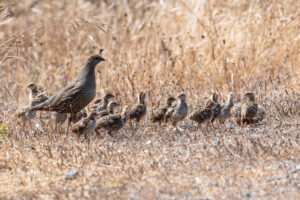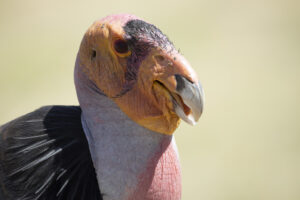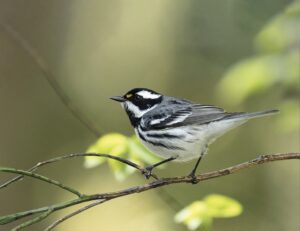Northern mockingbirds, year-round residents of the Bay Area (having expanded their breeding range here after the arrival of European settlers), each develop their own songs. Similar to those of other songbirds, mockingbirds’ songs consist of a specific configuration of syllables and phrases, sung primarily to court a mate or defend a territory. However, northern mockingbird songs are different from most of the world’s other 5,600 songbirds’ in that they consist of brief imitated phrases strung together and sung repeatedly—sometimes as many as a dozen times.
The great majority of other songbirds learn and memorize their songs from a mentor, either their own father or another singing male. Mockingbirds, however, take most of their sounds from the environment, sometimes from other mockingbirds, and always including a range of other bird vocalizations. Mockingbird songs may also incorporate the vocalizations of non-avian species, such as mammals (including the pet dog!) or frogs, and even electronic sounds, like car alarms and cell phones. These sounds are learned, memorized, and incorporated into the mockingbird’s ever-expanding repertoire.
From one spring to the next, an individual male mockingbird repeats a minimum of 35 to 63 percent of his previously heard song types, while at the same time adding more songs to his delivery. As a result, his vocal repertoire eventually grows to as many as 200 at “old age” (up to eight years). This explains why your backyard mockingbird changes its vocal personality from year to year, as well as why a mocker in Oakland will sound different from one in San Rafael.
What’s the advantage of crooning so many different tunes? Most likely, sexual selection: In selecting a mate, females may use size and complexity of the male’s song repertoire to judge his overall potential “fitness.”
It’s unlikely that most listeners—human or avian—are deceived as to the true identity of the singer when hearing mimicked bird songs. That is, you can generally detect—from variations in tone and context—the difference be-tween a mockingbird mimicking an Amer-ican robin, and a robin. And so can the robin. Accordingly, few researchers believe that mockingbirds displace the mimicked birds. Rather, the mockingbird sings to establish, or defend its territory from other mockingbirds.
Northern mockingbirds may sing year-round, but they are especially vocal during courtship and in autumn (when singing is used to establish territories for the coming winter). The next time you hear a mockingbird sing, stop and see if you can pick out the phrases and guess where they came from.




